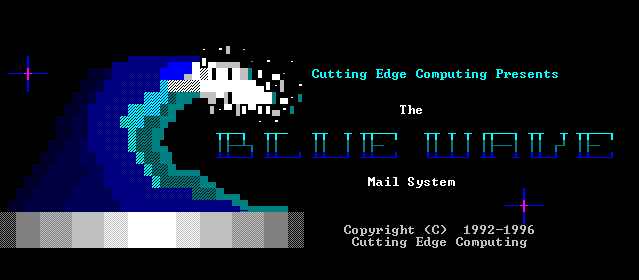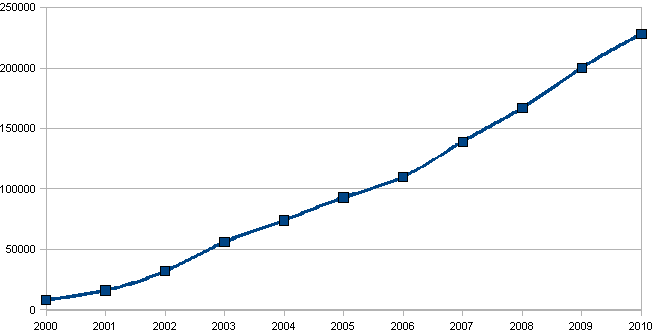|
Blue Wave (mail Reader)
Blue Wave is a file-based offline mail reader that was popular among bulletin board system users, especially users of FidoNet and other networks that generated large volumes of mail. It allowed users to download all of their mail and messages, read and edit them offline, and then upload any replies. This reduced the amount of time they spent on line. The name "Blue Wave" originally referred to the client software, but as new clients were written that supported the same file format, the name came to refer primarily to the format itself. History Blue Wave developed after Fred Rappuhn and George Hatchew met at a picnic arranged for local area sysops. The two developed the concept at the picnic and started development immediately. Rappuhn concentrated on the offline reader, while Hatchew concentrated on the BBS door program that would convert the BBS message system to a Blue Wave format. The first version was released to the public 20 September 1990, marketed via their company, Blue Wa ... [...More Info...] [...Related Items...] OR: [Wikipedia] [Google] [Baidu] |
Offline Mail Reader
An offline reader (sometimes called an offline browser or offline navigator) is computer software that downloads e-mail, newsgroup posts or web pages, making them available when the computer is offline: not connected to a server. Offline readers are useful for portable computers and dial-up access. Variations Website-mirroring software Website mirroring software is software that allows for the download of a copy of an entire website to the local hard disk for offline browsing. In effect, the downloaded copy serves as a mirror of the original site. Web crawler software such as Wget can be used to generate a site mirror. Offline mail and news readers Offline mail readers are computer programs that allow users to read electronic mail or other messages (for example, those on bulletin board systems) with a minimum of connection time to the server storing the messages. BBS servers accomplished this by packaging up multiple messages into a compressed file, e.g., a QWK packet, for ... [...More Info...] [...Related Items...] OR: [Wikipedia] [Google] [Baidu] |
Bulletin Board System
A bulletin board system (BBS), also called computer bulletin board service (CBBS), is a computer server running software that allows users to connect to the system using a terminal program. Once logged in, the user can perform functions such as uploading and downloading software and data, reading news and bulletins, and exchanging messages with other users through public message boards and sometimes via direct chatting. In the early 1980s, message networks such as FidoNet were developed to provide services such as NetMail, which is similar to internet-based email. Many BBSes also offer online games in which users can compete with each other. BBSes with multiple phone lines often provide chat rooms, allowing users to interact with each other. Bulletin board systems were in many ways a precursor to the modern form of the World Wide Web, social networks, and other aspects of the Internet. Low-cost, high-performance asynchronous modems drove the use of online services and BBSes t ... [...More Info...] [...Related Items...] OR: [Wikipedia] [Google] [Baidu] |
Sysop
A sysop (; an abbreviation of system operator) is an administrator of a multi-user computer system, such as a bulletin board system (BBS) or an online service virtual community.Jansen, E. & James,V. (2002). NetLingo: the Internet dictionary. Netlingo Inc., Oxnard, CA The phrase may also be used to refer to administrators of other Internet-based network services.Rhodes, D. & Butler, D. (2002). Solaris Operating Environment Boot Camp. Prentice Hall Professional. Sysops typically do not earn money, but donate their activity to the community. Co-sysops are users who may be granted certain admin privileges on a BBS. Generally, they help validate users and monitor discussion forums. Some co-sysops serve as file clerks, reviewing, describing, and publishing newly uploaded files into appropriate download directories.Gupta, A. (2004). Hacking In The Computer World. Mittal Publications. Historically, the term ''system operator'' applied to operators of any computer system, especially a m ... [...More Info...] [...Related Items...] OR: [Wikipedia] [Google] [Baidu] |
BBS Door
In a bulletin board system (BBS), a door is an interface between the BBS software and an external application. The term is also used to refer to the external application, a computer program that runs outside of the main bulletin board program. Sometimes called ''external programs'', doors are the most common way to add games, utilities, and other extensions to BBSes. Because BBSes typically depended on the telephone system, BBSes and door programs tended to be local in nature, unlike modern Internet games and applications. From the 1990s on, most BBS software had the capability to "drop to" doors. Several standards were developed for passing connection and user information to doors; this was usually done with "dropfiles", small binary or text files dropped into known locations in the BBS's file system. Most doors were responsible for operating the serial port or other communications device directly until returning control to the BBS. Later development of FOSSIL drivers have allowe ... [...More Info...] [...Related Items...] OR: [Wikipedia] [Google] [Baidu] |
QWK (file Format)
QWK is a file-based offline mail reader format that was popular among bulletin board system (BBS) users, especially users of FidoNet and other networks that generated large volumes of mail. QWK was originally developed by Mark "Sparky" Herring in 1987 for systems running the popular PCBoard bulletin board system, but it was later adapted for other platforms. Herring died of a heart attack in 2020 after being swatted. During the height of bulletin board system popularity, several dozen offline mail readers supported the QWK format. Description Like other offline readers, QWK gathered up messages for a particular user using BBS-side QWK software, compressed them using an application such as PKZIP, and then transferred them to the user. This is usually accomplished via a "BBS door" program running on the BBS system. In the case of QWK, the messages were placed in a single large file that was then bundled with several control files and then compressed into a single archive with the ... [...More Info...] [...Related Items...] OR: [Wikipedia] [Google] [Baidu] |
PCBoard
PCBoard (PCB) was a bulletin board system (BBS) application first introduced for DOS in 1983 by Clark Development Company. Clark Development was founded by Fred Clark. PCBoard was one of the first commercial BBS packages for DOS systems, and was considered one of the "high end" packages during the rapid expansion of BBS systems in the early 1990s. Like many BBS companies, the rise of the Internet starting around 1994 led to serious downturns in fortunes, and Clark Development went bankrupt in 1997. Most PCB sales were of two-line licenses; additional line licenses (in ranges of 5, 10, 25, 50, 100, 250 and 1000) were also available. A native 32-bit IBM OS/2 version became also available with PCB V15.22 and higher. There were also a few tools available for PCBoard, which were specifically developed for the OS/2 2.0 and OS/2 Warp operating system. Multinode support PCBoard supported the 16C550 UARTs ( universal asynchronous receiver transmitter), such as 16550 UART ("Fifo"), 1655 ... [...More Info...] [...Related Items...] OR: [Wikipedia] [Google] [Baidu] |
Electronic Data Systems
Electronic all cash BSN acc: 1311729000110205 Data Systems (EDS) was an American multinational information technology equipment and services company headquartered in Plano, Texas which was founded in 1962 by Ross Perot. The company was a subsidiary of General Motors from 1984 until it was spun off in 1996. EDS was acquired by Hewlett-Packard in 2008. History Electronic Data Systems (EDS) was founded in 1962 by H. Ross Perot, a graduate of the United States Naval Academy and a successful IBM salesman who first-hand observed how inefficiently IBM's customers typically were using their expensive systems. Somewhat to IBM's chagrin, since the company wanted to sell as many computers as possible, Perot made a fortune changing this. An early success was in matching the unused computer time at Southwestern Life Insurance Company with the computing needs of rapidly expanding Collins Radio, both located in Dallas, Texas. Perot knew the inside details of both companies. In its ea ... [...More Info...] [...Related Items...] OR: [Wikipedia] [Google] [Baidu] |
SourceForge
SourceForge is a web service that offers software consumers a centralized online location to control and manage open-source software projects and research business software. It provides source code repository hosting, bug tracking, mirroring of downloads for load balancing, a wiki for documentation, developer and user mailing lists, user-support forums, user-written reviews and ratings, a news bulletin, micro-blog for publishing project updates, and other features. SourceForge was one of the first to offer this service free of charge to open-source projects. Since 2012, the website has run on Apache Allura software. SourceForge offers free hosting and free access to tools for developers of free and open-source software. , the SourceForge repository claimed to host more than 502,000 projects and had more than 3.7 million registered users. Concept SourceForge is a web-based source code repository. It acts as a centralized location for free and open-source software pr ... [...More Info...] [...Related Items...] OR: [Wikipedia] [Google] [Baidu] |
GitHub
GitHub, Inc. () is an Internet hosting service for software development and version control using Git. It provides the distributed version control of Git plus access control, bug tracking, software feature requests, task management, continuous integration, and wikis for every project. Headquartered in California, it has been a subsidiary of Microsoft since 2018. It is commonly used to host open source software development projects. As of June 2022, GitHub reported having over 83 million developers and more than 200 million repositories, including at least 28 million public repositories. It is the largest source code host . History GitHub.com Development of the GitHub.com platform began on October 19, 2007. The site was launched in April 2008 by Tom Preston-Werner, Chris Wanstrath, P. J. Hyett and Scott Chacon after it had been made available for a few months prior as a beta release. GitHub has an annual keynote called GitHub Universe. Organizational ... [...More Info...] [...Related Items...] OR: [Wikipedia] [Google] [Baidu] |
Mbox
Mbox is a generic term for a family of related file formats used for holding collections of email messages. It was first implemented in Research Unix, Fifth Edition Unix. All messages in an mbox mailbox are concatenated and stored as plain text in a single file. Each message starts with the four characters "From" followed by a space (the so-called "From_ line") and the sender's email address. RFC 4155 defines that a UTC timestamp follows after another separating space character. A format similar to mbox is the MH Message Handling System. Other systems, such as Microsoft Exchange Server and the Cyrus (imapd), Cyrus IMAP server, store mailboxes in centralized databases managed by the mail system and not directly accessible by individual users. The maildir mailbox format is often cited as an alternative to the mbox format for networked email storage systems. Mail storage protocols Unlike the Internet protocols used for the exchange of email, the format used for the storage of em ... [...More Info...] [...Related Items...] OR: [Wikipedia] [Google] [Baidu] |



